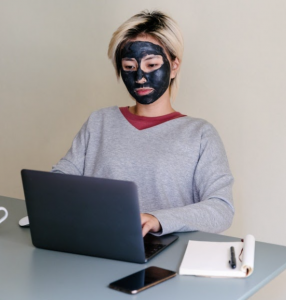2020 has thrown the world a lot of curve balls. One of them is the need to adapt the way we engage and learn from each other to a remote format. The EDITLab’s newest student, Elisavet Palaiologou, shares her experience of starting a Master’s course in the middle of a pandemic. Luckily, it is not all doom and gloom. Read on for some really interesting observations and helpful ideas on how to survive and thrive.
Could online learning be the new normal?
I would have never imagined that I would be doing my master’s degree remotely… let alone in my dressing gown!
But here we are, attending lectures online, discussing questions via online forums and group chats and chatting with people whose faces we may have never seen before.
Not knowing when this will end, I sometimes wonder whether this could be the new normal.
The truth is, even though at first online learning did not sound very exciting, I now realise it offers a variety of opportunities and benefits that I had not previously considered.
Connecting with peers
Geographical boundaries and immigration bureaucracy are not a limit anymore. Students can now attend lectures from anywhere in the world and “meet” students from different backgrounds, giving us more opportunity for cultural exchange.
The flip side of this coin, though, is that online calls limit human contact, and that is what I miss the most. I miss chatting to my coursemates while waiting outside the lecture room, seeing my lecturers every day and being taught by them in person, and bumping into old friends on our lovely campus that is usually full of life.
Nonetheless, as a cohort, we have done our best to make up for what we are unable to experience. We have created group chats on various platforms such as Facebook, Whatsapp and Discord. This not only facilitates the exchange of ideas on course-related topics but are also spaces for us to connect on a more personal level. We have also created a group chat with the students (5 in total) from my personal tutor group, which makes asking questions and bonding easier, as there are fewer of us. Asking questions in a group with over 70 people can be intimidating sometimes after all! Undoubtedly, remote learning can make us feel disconnected from the cohort, but having these opportunities to connect has made me feel like I belong and am always supported.
Studying from home
Studying online, from the comfort of our homes, saves us our commute time and money. Students are spending this time exercising, reading our favourite books, or simply sleeping for an extra hour in the morning!
However, it is more difficult maintaining concentration and staying engaged throughout lectures online. Increased screen time does not help either. I find myself feeling a build-up of fatigue and in turn, zooming out (pun intended) more easily.
Personally, I’ve found that using my “morning commute” time to exercise is energising and helps me maintain my focus throughout the day. It also just gets me out of the house. As for my “evening commute”, it’s just an extra welcome hour to wind down.
Live vs pre-recorded lectures
Before starting my course, I had not considered the difference between online live lectures and pre-recorded ones. Our course was initially designed with more pre-recorded lectures than live ones in an effort to accommodate students who live abroad. Pre-recorded lectures offer the benefit of learning at your own pace as they allow you to take as much time as you need to understand the content and take notes. However, they are non-interactive and it requires good organisation and time management skills to stay up to speed with the schedule.
As a cohort, we immediately expressed our concerns about pre-recorded lectures to our course leaders, and it was great to see that immediate action was taken. An entirely new schedule with the majority of lectures live was coordinated, and this has transformed our learning experience. Online live lectures are more engaging as they better imitate the classroom/lecture environment we are all familiar with. Although we lost the flexibility of recorded lectures, we gained the opportunity for discussion both with the lecturer and students, making it a more dynamic learning process overall. In them, I feel like I’m learning with others rather than by myself.

Whether or not working and studying from home is going to be part of our ‘new normal’, there are some valuable things we can learn from this experience.
As I am getting more used to the new format and lifestyle and I reflect on my experience in the past few months, I realise how important it is for both the students and the universities to work together, be open to communication and allow some time before deciding what works best for both parties. There is not a single “recipe” for what works best in this new online process. It depends on the students’ needs, the course’s demands and the university’s guidelines.
Online learning in this magnitude is new to most, and although it is not yet clear whether it will become the new normal, the only thing we know for sure is that it is here to stay at least as long as the pandemic. So even though we may not be getting the “full university experience” we all expected when applying for our courses, let’s take advantage of the opportunities it offers and make our online learning the fullest possible experience.


